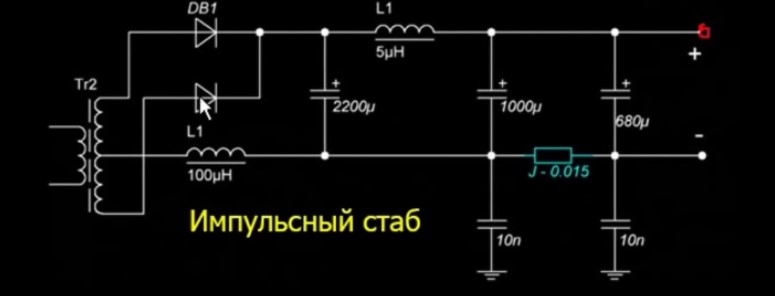
, . , . -« ».
Sonus lumine veritatis
The main factor that should be concerned about the audiophile in the device's power supply, according to the adherents of "pure electricity", is the circuit diagram of the device. The reasoning is based on the following theses: heretical impulse units power amplifiers with the wrong, dirty electricity, from bad Chinese sockets and not inspired by the sacred cost of power filters. Also, sometimes a maxim sounds: "Real sound" cannot be obtained without an uninterruptible power supply. Impulse plugs, bad sockets and Chinese filters spoil the sound absolutely monstrously with eerie noise and distortion, which brings the same “dirty” electricity from a non-audiophile public electrical network.
Power supplies
The arguments on forums and in specific posts are very diverse, from high-frequency interference (actually in some budget devices), from poorly designed impulse power supplies that are attributed to all power supplies of this type, to completely surreal, parascientific, esoteric-metaphysical arguments about “ wrong "behavior of electrons in" wrong "conductors and the significant role of" sinusoidal "power for the fidelity of the amplifier.
If we reduce all phylophonic claims to impulse PSUs, we can derive the following rule:
"Horrible switching power supplies built on godless silicon chips saturate the signal with harmful distortion and generate noise that spoils the useful signal."This argumentation is usually supplemented by links to numerous references to the fact that impulse units are capable of being noise generators, as well as the obligatory mention of the fact that it is impossible to notice the difference in budget devices and middle-class devices, but in the ever-memorable high-end, it will definitely come out there sideways all the electrical "dirt".
And we can even say that the last thesis is not devoid of meaning, since high end is often dealt with by little-known companies with semi-literate engineers who are sometimes simply not able to create a well-working switching power supply, which is why circuitry myths arise. It is much easier to equip another single-cycle tube masterpiece without OOS, and with an efficiency of 0.001%, a huge power transformer, the size of an amplifier floor, and sometimes two-thirds and a huge mass due to a transformer and a cooling radiator. Indeed, in the minds of audiophiles, the engineers of their beloved company are the demigods of their pantheon, and accordingly, they a priori cannot offer an ineffective and illogical solution. The position is extremely convenient and allows to sell tons of copper annually.
Outlets and filters
Any problem of fidelity of reproduction, according to the postulates of the audio religion, can also be blamed on the problems of local electrical engineering. For this, electricity in public networks is declared dirty and not audiophile enough to interfere with the signal. In order to prevent these interference from appearing, it is recommended to use audiophile surge protectors and sockets, and ideally, special uninterruptible power supplies, as you probably already guessed, are audiophile. The cost of the latter can be 10, and sometimes a hundred times higher than not audiophile. It is quite natural that the difference in sound can be noticed only when using high-end equipment and no less expensive.
Regarding uninterruptible power supplies with a high-capacity battery, it should be noted that they are really used by professionals in studios, since sudden network problems in the studio when recording a critical track can bring her considerable losses, from which they try to insure themselves using an uninterruptible power supply. Filters (even the most inexpensive and primitive ones) can actually prevent some network-related interference. Interestingly, in non-audiophile circuitry, they often seek to eliminate network interference that the amplifier itself can cause, and not vice versa.
Why do audiophiles really hear the difference?
The most interesting thing is that adherents of divine sound really hear the difference when replacing sockets, surge protectors, impulse units with classic transformer ones. And the point here is not at all in the physics of sound. The organ responsible for perception, including the information we hear, is the brain. Any perception is subjective to one degree or another, which means that it can be influenced, among other things, by the listener's delusions.
Thus, knowing that the system is connected to the network using pure rhodium contacts, through a surge protector costing from 500 to 1000 USD, and the amplifier is powered by a classic transformer power supply, there is a conviction that the sound will improve. This is the perfect breeding ground for a persistent cognitive illusion. I was convinced more than once that the illusions of such a plan for those who experience them are much more real than the most truthful reality, since the basis is not only a sincere delusion, but also two, or even three thousand dollars spent on acquiring an illusory result.
Dry residue
The type of power supply, the cost of the filter and even the outlet really significantly affect the sound, if the one who bought them believes in such an influence. An improperly designed power supply can significantly spoil the sound, this applies to both pulse and transformer. The transformer boxes are huge, heavy and heat up very quickly. A common mains filter is sufficient to prevent the unlikely network interference. It makes sense to use an uninterruptible power supply in a studio, at home it is not very useful and it does not affect the sound quality in any way.
Also in the topic I recommend the following
Video
: , , , , . , , , .